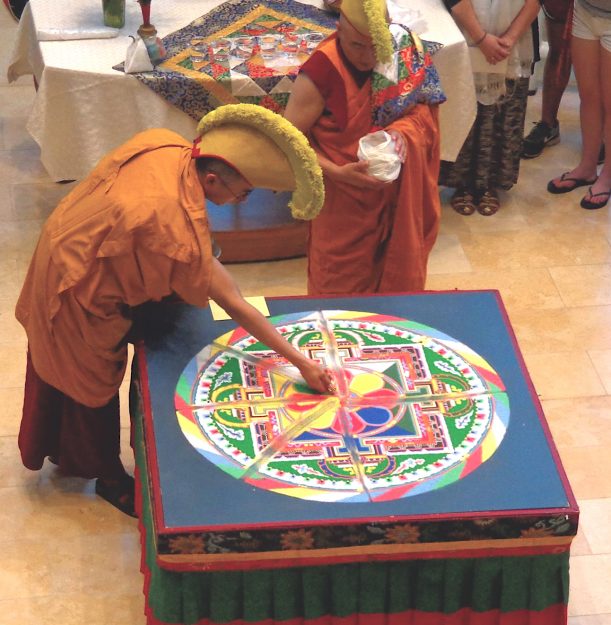In the 1960s, the scholar Richard Robinson helped establish the field of Buddhist studies in Western academia, developing an interdisciplinary program at the University of Wisconsin-Madison that taught linguistics, history, and art, and set an example that other institutions quickly sought to replicate. “There [was] no limitation,” said Lewis Lancaster, the first graduate of the program, who went on to found a PhD program at the University of California, Berkeley. In recent years, as religious studies programs overall have been shrinking, the legacy of Robinson’s cross-disciplinary approach has allowed Buddhist studies to open its purview and attract an increasingly wide range of students.
When Buddhist studies programs started showing up in Western course catalogs, most students enrolled to learn about Buddhist philosophy and history; but more recently programs have drawn students with interests in topics such as ethics and mental-health management, according to several Buddhist studies professors who spoke with Tricycle. As a result, Buddhist scholarship has diversified from focusing only on canon and philosophy to examining how Buddhism intersects with culture, society, politics, economics, gender studies, literature, and sociology.
Of course, this change also reflects an attempt to maintain enrollment numbers in religious studies programs even as students’ interests change. In general, the pursuit of religious studies degrees has decreased. Yale University, for example, awarded fifteen undergraduate degrees in 2007 and just four in 2017. (A 2017 study by the US Department of Education found that humanity degrees declined by 7 percent from 2009 to 2015.)

Buddhist studies programs have evolved to meet this challenge. In addition to offering graduate degrees in religious studies and divinity, some universities, including Naropa University in Boulder, Colorado, now offer concentrations rooted in Buddhism that supplement master’s degrees in counseling, psychotherapy, psychology, and ethical thought. And while many traditional Buddhist studies programs still require proficiency in ancient languages such as Tibetan and Sanskrit, others have dropped or loosened the requirements to allow Buddhist ideas to speak to a larger audience.
An interdisciplinary approach may be key for keeping these programs active, scholars argued in a 2015 article in the Harvard magazine Colloquy. “We have to shift away from teaching religion exclusively to students who are concentrating in the subject or who are doctoral students,” Harvard professor of South Asian religions Anne E. Monius commented. “Speaking to contemporary events and showing the way religion is deeply enmeshed in politics, economics, sociology, historical structures—that is something the field has to attend to more carefully moving forward.”
This strategy appears to be working. Despite lower enrollment in degree programs, many universities, including Yale, have seen more students signing up for religious studies classes, and Buddhist studies has become a popular elective that feels relevant to students pursuing other degrees. Cole Harbur, a 2016 year graduate of Elon University, majored in business but took Buddhist studies courses. “The business world lacks a solid background in contemplative education,” said Harbur, now the associate director at the Institute for Organizational Mindfulness, which helps introduce mindfulness into professional settings, “and the leadership and creativity that is needed in the business world could be improved by those experiences.”
Talia Ivry, a senior at Pomona College, was a psychology major when she first took a Buddhist studies class. “The terms mindfulness and meditation were used a ton in new wave psychology but rarely in connection with Buddhism,” Ivry said. “I wanted to learn more about where they came from and what they actually mean.” (She later changed her major to religious studies.)
The popularity of mindfulness has also influenced how prospective students view Buddhist studies. Elon University professor Pamela Winfield noted that while her Buddhist studies courses have always been in high demand, lately students have been expecting her class to teach them tools for managing anxiety and stress. She reminds her classes that she teaches “about religion, not how to be religious,” but students have told her that simply learning about Buddhist ideas has helped them in their personal lives.
And even though the number of applications has declined, Harvard professor and Buddhist scholar Janet Gyatso said that the quality of the applicant pool remains strong, and she sees the increasingly interdisciplinary direction as a positive development for the field. “As the generations turn over,” she told Tricycle, “people are coming in with influences from other parts of the academy—from literature, gender studies, postcolonial criticism—and realizing that these things apply to the Buddhist world as well.